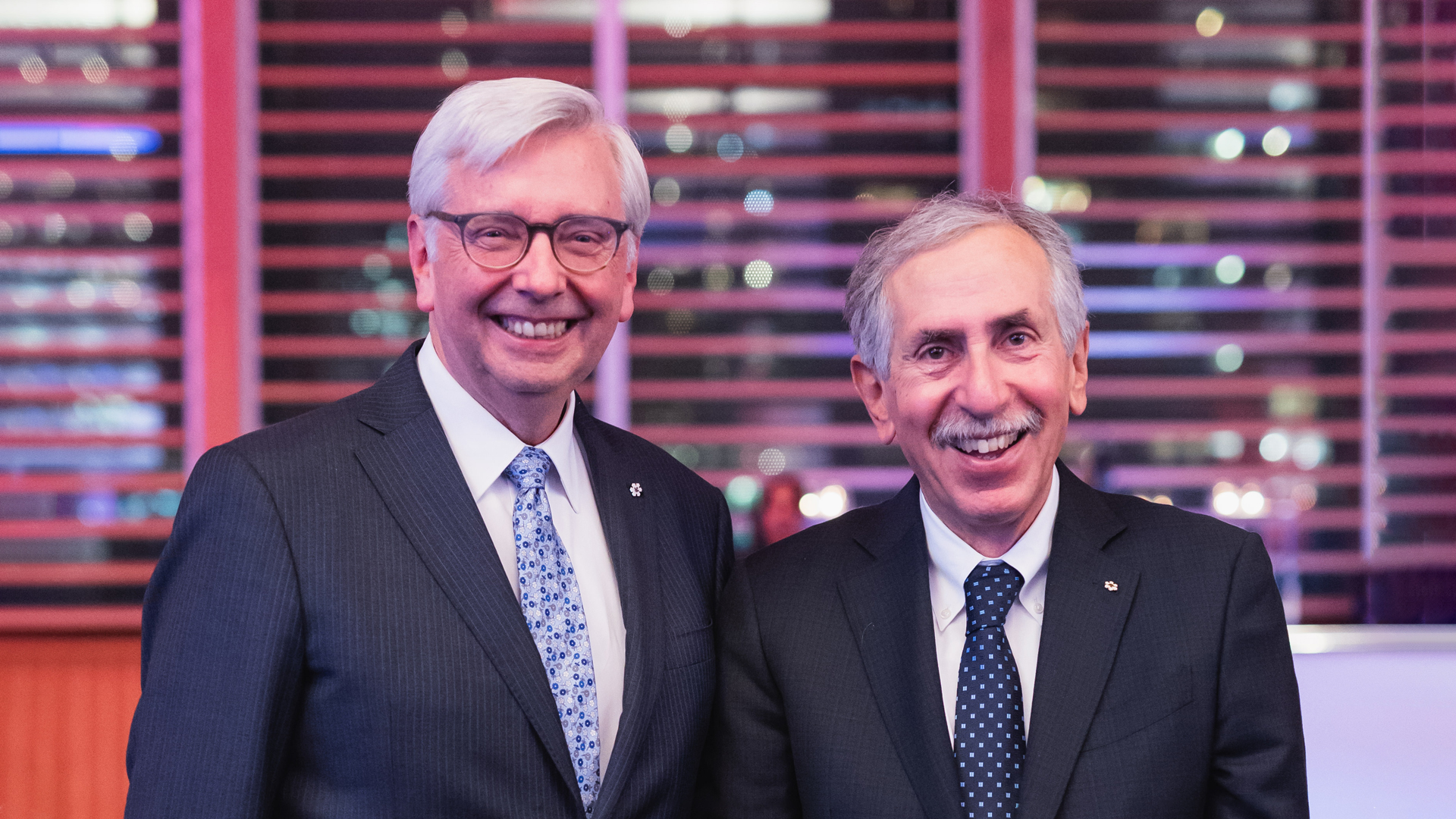By: Liz Do
2 Nov, 2022

The two sat down for an in-depth conversation, reflecting on Bernstein’s decade at the helm of CIFAR, and Toope’s vision for its future.
—
Stephen: Alan, I’m curious what you felt when you joined CIFAR as President and CEO. What was the first year like?
Alan: There was some adjusting in my first year — though I had been used to starting new organizations, such as CIHR and the Global HIV Vaccine Enterprise. And, of course, I had started my own lab. Having said that, I had never actually taken over an organization from somebody.
When I joined CIFAR, my metaphor was: when you move into a house, don’t renovate right away, live in it for a while and then decide what you don’t like, what you do like and what works.
I spent my first year talking to a lot of people: board members, staff, our fellows. I wanted to hear directly what they liked about working at CIFAR and what issues they struggled with. Mostly, I heard extremely positive things and that really energized me.
However, I was also looking at the walls I needed to knock down and the rooms that needed repainting. One example was the Global Call for Ideas that came out of conversations I had with CIFAR fellows. It led to us rethinking how we create new programs and how we enable a more level — and global — playing field for ideas.
Stephen: CIFAR has gone from strength to strength in the last decade. There is a part of me that’s coming to just listen and learn. I will be talking with everyone I can and gaining from the perspectives of staff, fellows, and other people who are beneficiaries of the organization. I think there is a fundamental point, which is, “Don’t fix what isn’t broken.”
So — to continue the metaphor — in the renovation, I don’t think I have to get into redoing all the plumbing and electrics. I think a lot of the structural pieces are really, really strong. It’s always the case, though, that organizations need to rethink and refresh themselves and that’s what I’m imagining CIFAR doing over the next few years.
Alan: Stephen, when you were approached about CIFAR, what made you decide to say yes?
Stephen: I am so impressed by CIFAR’s commitment to excellence at a global level. I think that’s one of the things that I have always felt was a unique attribute of this organization. With great respect, in the Canadian context, I think CIFAR is one of the few organizations that is absolutely comfortable with saying that it wants to be operating at the highest levels of achievement, globally. And that, to me, is extremely exciting.
At the same time, I also do get the impression that the organization is willing to rethink aspects of itself. I think that’s crucially important for any entity, especially a not-for-profit. There is also a fundamental commitment to trying to figure out how to engage as effectively as possible with early-career researchers.
I think there has been attention given to greater diversity, both in terms of staff and in terms of fellows — I still think there’s more to do there. And that’s actually both a challenge and an opportunity for me. I think it’s an organization that’s willing to challenge itself. That is what I would hope we’ll be able to continue to work on over the next couple of years.
I want to make sure we’re doing the very best we can to continue to deliver at the highest level, but perhaps in some new ways.
Alan: Adding to that, the objective and vision of operating at the highest level of international excellence with diversity around the table — not just diversity in disciplines and countries, but of ethnicity, religiosity— are a journey we have only just begun.
Stephen: I think it’s a journey that the whole research community has only just begun. We’re not at the forefront of those questions in society. I mean “we” as an extended research community.
On that note, I wanted to ask you: what would you say is one of the most difficult or challenging moments or issues that you’ve had to face while being President and CEO?
Alan: That’s a good question. When it comes to people, it goes back to interdisciplinarity — it can be hard for some academics to be truly interdisciplinary. That’s why we do what we do: we provide sustained interactions, which ideally lead to a new synthesis, a new way of looking at a problem.
And now that we look ahead to your leadership at CIFAR: I’m wondering: what’s the one item that is not on your CV that you would like others to know about?
Stephen: I would say that I genuinely like to be challenged. I enjoy working in environments where people feel they can express their own beliefs and give me the best possible advice. I really want to hear what people think about an issue, not just what they may think I want to hear. For me, the most exciting part of being at great institutions — like the University of British Columbia, University of Cambridge, U of T or McGill University — has been really smart people getting around the table and collectively coming up with better approaches that I wouldn’t be able to come up with on my own. I think that’s something I derive a lot of energy from.
Alan: We’re just about to run out of time, but I want to thank you, Stephen, for this wonderful chat. I’m looking forward to all the amazing things that will happen at CIFAR under your leadership.
Stephen: And I equally look forward to having much more detailed chats with you, Alan. Thank you.